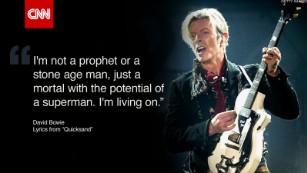Bowie died Sunday after an 18-month battle with cancer, his publicist Steve Martin told CNN.
"David Bowie died peacefully today surrounded by his family after a courageous 18 month battle with cancer," said a statement posted on his official social media accounts. "While many of you will share in this loss, we ask that you respect the family's privacy during their time of grief."
Neither his publicist nor the statement elaborated on what type of cancer the singer had.
Bowie's death has been the regular subject of Internet hoaxes for the last several years. So the news came as a shock to fans and industry insiders when it was confirmed.
"Very sorry and sad to say it's true. I'll be offline for a while. Love to all," his son, "Moon" film director Duncan Jones, tweeted.
Marriage of music and fashion
From a mop-topped unknown named David Jones, to his space-alien alter ego "Ziggy Stardust," to his dapper departure as the soul-influenced Thin White Duke, Bowie married music and fashion in a way few artists have been able to master.
He was theatrical, he was flamboyant, he was without parallel in his showmanship.
His albums, especially after his 1972 breakthrough "The Rise and Fall of Ziggy Stardust and the Spiders from Mars," were treated as events. His songs, including "Changes," "Fame," "Heroes" and "Modern Love," were anthemic hits, played constantly on the radio and inspiring generations of musicians.
With a voice that soared from a baritone to a falsetto, he spoke of carrying on against the odds. Of the terror in knowing what the world is about. Of turning and facing the strange.
His songs were a salve for the alienated and the misfits of the world.
That in a nutshell was Bowie: There was hardly a musical style he didn't dabble in -- and indelibly leave his mark upon.
Since his breakthrough with "Ziggy Stardust," Bowie's reach was eclectic: glam rock, prog rock, pop rock, electronic rock.
And the results? Electric. To the tune of more than 130 million records sold. The album titles, including "Aladdin Sane," "Station to Station" and "Scary Monsters," are familiar to any music fan.
Though he didn't have his first No. 1 single in the United States until "Fame" in 1975, he'd already been making a mark with heavily played singles, including "Space Oddity," "Changes," "Suffragette City," "Rebel Rebel" and his first Top 40 hit, 1975's "Young Americans."
After that, he was almost as present on the singles charts as the album charts, with hits such as "Golden Years," "Under Pressure" (with Queen), "Let's Dance" (another No. 1), "Blue Jean" and "Never Let Me Down."
"David Bowie was one of my most important inspirations, so fearless, so creative, he gave us magic for a lifetime," tweeted rapper Kanye West, as news of Bowie's death made the rounds.
Changing looks
He was born David Jones, to a waitress and a nightclub owner in South London on January 8, 1947.
Though he began his musical life with his birth name, riding the mod wave of the mid-1960s, he changed to "Bowie" to avoid confusion with Davy Jones, the lead singer of the Monkees, who was enjoying serious pop success at the time.
That reinvention was the first of many. And his timing was often impeccable.
He released his song about a doomed astronaut, "Space Oddity," just days before the 1969 moon landing.
Four years later he killed off his most famous creation, the other-worldly "Ziggy Stardust," just at the point where it threatened to overwhelm him.
He soon transformed into the Thin White Duke, a cocksure but coked-out mad aristrocrat. While Ziggy was all arena rock, the Duke was chilled soul. While Ziggy gave him "Space Oddity," the Duke gave him yet another timeless classic, "Fame," a song co-written with John Lennon, one of his many admirers.
Such speedy changes could catch his fans off guard.
"I went to the 'Diamond Dogs' show (in June 1974) expecting something like Ziggy Stardust," fan John Neilson told NPR in 2014. "And then in October I expected to see something like 'Diamond Dogs,' and it was the soul revue. It might as well have been a completely different artist."
Bowie was as much observer as observed. In a 1974 interview with Dick Cavett, he said he started carrying a cane when he noticed his fans doing so.
"He was chameleon in many ways, as we know," stage and film producer Robert Fox told CNN's Christiane Amanpour. "But he could become a very ordinary-looking man. And sometimes I'd meet him in New York at a café, and people wouldn't recognize him. And they'd be sitting three feet from him. He could just -- he could fit in."


No comments:
Post a Comment